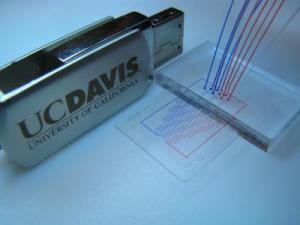Nov 30 2010
Biomedical engineers at UC Davis have developed a plug-in interface for the microfluidic chips that will form the basis of the next generation of compact medical devices.
They hope that the "fit to flow" interface will become as ubiquitous as the USB interface for computer peripherals.
 The clear block to the right is the Fit-to-Flow connector, with a microfluidic chip inserted. Channels take red and blue fluid through the connector to the chip. USB flash drive shown for scale.
The clear block to the right is the Fit-to-Flow connector, with a microfluidic chip inserted. Channels take red and blue fluid through the connector to the chip. USB flash drive shown for scale.
UC Davis filed a provisional patent on the invention Nov. 1. A paper describing the devices was published online Nov. 25 by the journal Lab on a Chip.
"We think there is a huge need for an interface to bridge microfluidics to electronic devices," said Tingrui Pan, assistant professor of biomedical engineering at UC Davis. Pan and graduate student Arnold Chen - invented the chip and co-authored the paper.
Microfluidic devices use channels as small as a few micrometers across, cut into a plastic membrane, to carry out biological or chemical tests on a miniature scale. They could be used, for example, in compact devices used for medical diagnosis, food safety or environmental monitoring.
Cell phones with increasingly sophisticated cameras could be turned into microscopes that could read such tests in the field.
But it is difficult to connect these chips to electronic devices that can read the results of a test and store, display or transmit it.
Pan thinks that the fit-to-flow connectors can be integrated with a standard peripheral component interconnect (PCI) device commonly used in consumer electronics, while an embedded micropump will provide on-demand, self-propelled microfluidic operations. With this standard connection scheme, chips that carry out different tests could be plugged into the same device -- such as a cell phone, PDA or laptop -- to read the results.
Source: http://www.ucdavis.edu/